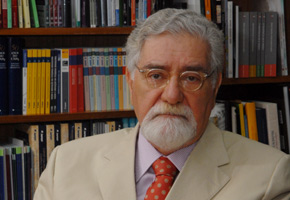New legal pathways in the 21st century honor Celso Lafer
Book offers a collection of articles by specialists working in the same fields as Lafer, the FAPESP president and retired law professor at Universidade de São Paulo’s Law School.
New legal pathways in the 21st century honor Celso Lafer
Book offers a collection of articles by specialists working in the same fields as Lafer, the FAPESP president and retired law professor at Universidade de São Paulo’s Law School.

Book offers a collection of articles by specialists working in the same fields as Lafer, the FAPESP president and retired law professor at Universidade de São Paulo’s Law School
By Elton Alisson
The book was published in honor of Celso Lafer, president of FAPESP and retired professor at USP’s Law School, where he headed the Department of Philosophy and General Theory of Law.
Coordinated by Luiz Olavo Baptista and Tercio Sampaio Ferraz Junior, both law professors at USP’s Law School, the book brings together 40 unpublished articles penned by specialists in some of Celso Lafer’s diverse areas of activity, such as international law and legal and political philosophy.
To select articles, the coordinators of the publication invited renowned specialists in national and international law who are engaged in the same fields as Lafer pursued as a professor, diplomat and minister, among other roles, to write about these areas of specialization as a reflection on legal pathways in the 21st century.
The number of articles submitted surpassed estimates and could not be published in a single volume. As a result, the coordinators of the edition opted to publish the articles that refer to Lafer’s other specialization areas, such as the philosophy of law, human rights and economic law, in two volumes of the Revista Brasileira de Filosofia, launched in 2011.
“The huge volume of articles that we received for the book honoring Professor Celso Lafer shows how much he is esteemed, not only in the Brazilian academic community but also internationally,” comments Baptista in an interview with Agência FAPESP.
“We received contributions from authors from several countries, which shows that he is known not only in Brazil but also abroad,” he notes.
Some foreign authors of articles published in the book are Álvaro de Vasconcelos, who was the director of the European Institute of Security Studies (EUISS) until May of this year, and Félix Peña, the director of the International Trade Institute of the Standard Bank Foundation in Argentina.
Among the Brazilian authors is the literary critic, sociologist and professor Antonio Candido and the lawyer, writer and judge Fábio Konder Comparato, in addition to USP law professors and current and former ministers. “The book also has some articles from diplomats covering Lafer’s influence on international relations,” says Baptista.
According to Baptista, there is a tradition in major academies worldwide for professors to be honored by friends and students with a publication, known by the Latin name liber amicorum (a book by friends) or liber amicorum et discipulorum (a book by friends and disciples).
In this case, the publication dedicated to Lafer was a “book in honor of” because, according to Baptista, the publications have characteristics that differ from a conventional “book by friends.”
“The book brings together articles from people who were professors or mentors of Professor Lafer and reflects on the vision of law both from his generation and from the previous and the next generations. It is a rare and much-deserved honor that pleased us immensely to realize,” Baptista says.
For Lafer, the book has a very special personal significance. “For a professor, nothing is more gratifying than the recognition of his colleagues and peers. The book is part of a very special moment, which is the life transition from an active professor to a new stage,” he said.
Public life and intellectual activity
Born August 7, 1941, in São Paulo, Lafer graduated with a law degree from the Universidade de São Paulo Law School in 1964. He completed his master’s (1960) and doctorate (1970) degrees in political science at Cornell University.
Lafer was the External Relations Minister in 1992 and again in 2001 and 2002 and was the Minister of Development, Industry and Commerce in 1999. In 1992, he was vice-president of the Conference on the United Nations Organization on Environment and Development (Rio-92), held in Rio de Janeiro.
From 1995-1998, he was ambassador, chief of Brazil’s permanent mission to the United States and the World Trade Organization in Geneva. At the WTO, he was president of the Dispute Settlement Body (1996) and the General Council (1997).
In 2002, he received the highest honor from the science and technology community in Brazil, the Order of Scientific Merit. He is a member of the Brazilian Academy of Sciences (elected in 2004) and the Brazilian Academy of Letters (elected in 2006).
Holding honorary doctorates from Universidad de Buenos Aires (2001), da Universidad National de Córdoba (2002) and the Universidad Nacional de Tres de Febrero (2011) (all in Argentina) as well as the Université Jean Moulin – Lyon 3 (2012) in France, among other distinctions, Lafer received the Prêmio Moinho Santista Award for International Relations (2001).
In August, he received the title of professor emeritus from USP’s International Relations Institute.
Lafer has presided over FAPESP since September 2007. He is the author of several works on philosophy, international law, human rights and Brazilian policy.








